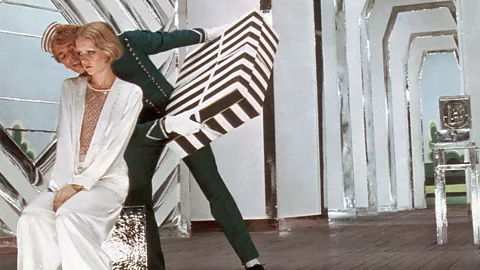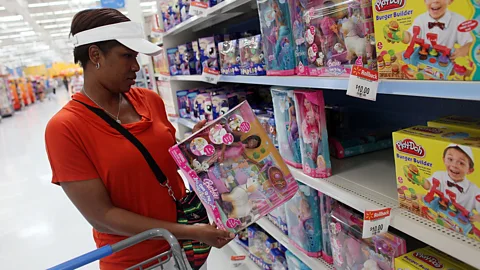Why do we spend so much money on others?
 Getty Images
Getty ImagesWe’ve all splashed out on pricey gifts for close friends and relatives. Scientists say our splurging may be down to a complex mix of biology and psychology.
Have you ever splashed out on a present for someone you love, spending far more than you would on yourself? If so, you’re not alone.
Research from the 1970s suggests that when we buy something as a gift, we spend more time shopping and seeking advice, as well as more money, than we would if we were using the item ourselves. When it comes to important presents – like buying a special anniversary gift that only happens a few times in a lifetime – high purchaser involvement can increase the amount of care and money that goes into the purchase, says Russell Belk, a professor of marketing at the University of York in Toronto, Canada. Other factors like social expectations can also influence when and why we spend more on gifts, he adds.
But other studies have also shown that we spend more money on our family and best friends. So why is this? Does a pricey present send a specific kind of signal or is it really more to do with how giving it makes us feel? When we pick up that extra stuffed toy for our child or choose the top-end gadget for our spouse, what is it that makes us ignore the cost and happily hand over our credit card?
 Getty Images
Getty ImagesFirst, look at your biology
Splurging on close relatives may be related to evolutionary psychology, says Sigal Tifferet, senior lecturer at the Ruppin Academic Center in Israel and co-author of a study on how genetic relatedness affects gift-giving at Israeli weddings. The research found that close genetic kin gave more money to newlyweds than friends, while close friends gave more than distant kin.
“If we take people with the same level of acquaintance, kin will usually give more,” she says. “Evolutionary psychology claims that the reason lies in our unconscious drive to act in a way that would benefit the spread of our genes. Since my close relatives share more genes with me, natural selection has selected for the trait of investing in close kin.”
We have evolutionary reasons for investing in friends as well, Tifferet adds. “Although we do not share as many genes with them, the mutual relationship is evolutionary beneficial and should be strengthened,” she says, a fact that may help explain why close friends give more than distant kin.
Elizabeth Dunn, a psychology professor at the University of British Columbia in Canada, also points to an evolutionary explanation for our gift-giving. In a 2008 study, 46 university students were given $5 or $20 and told to spend the money on themselves or on somebody else.
Those who spent the money on another person reported feeling happier than those who were directed to spend it on themselves. This was despite another finding made by the team: we tend to underestimate the power of giving to others. Participants reported that they thought spending on themselves would make them happier than spending on others.
 Alamy
AlamyDunn says there is a reason we feel joy when we give to others; our tendency to share resources led to the survival of our species. Doing so makes us feel like we have autonomy and the ability to make a difference to someone else. “It can enhance feelings of self-confidence and perhaps most importantly, create this feeling of connection that seems to be really crucial to our well-being,” she says. “We think it is a critical building block of human nature and underlies our success as a species.”
Then look at your EQ
Yet while we often find happiness in giving presents, our personalities – specifically our emotional intelligence – may play a role in dictating the extent to which we splurge. In a series of recent studies, Rajani Pillai, an associate professor of marketing at North Dakota State University and Sukumarakurup Krishnakumar, an associate professor at the Keck Graduate Institute in California, found those with higher levels of emotional understanding spent more money on gifts for others, especially people they were close to, and experienced greater happiness doing so.
“The idea is that people with higher emotional understanding can better predict their own emotions, as well as those of the receiver, and how these emotions will connect back to your relationship,” Pillai says. “They can better understand how important that gift giving is to the relationship and that’s why they choose to give more. And when you’re giving to people with whom you have a closer relationship, then there have been more opportunities to learn and understand the emotions of the receiver.”
Krishnakumar says that happy anticipatory emotions start before the gift is given, during the shopping process. “When people are shopping, they are trying to predict emotions, including positive emotions like anticipatory happiness or joy,” he says. “There can be some negative emotions too – anxiety might be involved.” When people are uncertain if they’re making a good decision they are much less likely to make a purchase, he explains, which may be another reason we spend more on those we know best.
Sending messages
Of course, it’s not just down to evolution and biology that we give presents. Experts have identified plenty of other reasons, from the altruistic – cheering someone up – to the self-interested, like demonstrating status, feeling guilty or making someone feel indebted to us.
In romantic relationships, says Yohsuke Ohtsubo, a psychology professor at Kobe University in Japan, gift-giving can serve as commitment signal. In a recent study, he examined how social mobility – or the extent to which partners interacted with people outside their romantic relationship – affected gift-giving behaviour.
They found that those who had more people in their lives spent more money on gifts for their romantic partners to signal commitment. One interesting finding was that married couples in the US – where the divorce rate is high – gave more gifts to each other than married couples in Japan, where the divorce rate is relatively low.
 Alamy
Alamy“Even after the courtship period when people are married, commitment signals are important. We found that this is especially true when relational mobility is high and we need to show our commitment to our partner more frequently,” Ohtsubo says. “If you spend a lot on one partner you have limited resources to spend on others – that’s why expensive gifts serve as a commitment signal.”
Belk says the symbolic nature of gifts often justifies the price from the giver’s point of view. “Unlike buying something for yourself, when out of modesty or economic necessity we try to economise, a gift is meant to be special. A gift is not an ordinary exchange, and it generates reciprocity. It communicates something to the receiver so we can justify splurging and even wastefulness, because we’re trying to build some symbolic content.”
And recipients do notice when the giver tries to get a deal. Research from 2015 shows that when receivers discover a gift was purchased at a discount, they appreciate it less. Belk points to the fact that even the rituals surrounding gift giving are extravagant. “Wrapping the present mystifies the gift as the person unwraps it and makes it more alluring. But it is also more wasteful – that’s the price of being extravagant.”
Small, but expensive
Yet if we spoil our partners or splurge on friends, that may be nothing compared to what we spend on our kids. One survey of winter holiday spending in the United States in 2017 found that parents were planning to spend about $330 on gifts per child, compared to $196 on significant others, $90 on siblings and $57 on best friends.
Again, this may be partly down to evolution – a desire by the older generation to help descendants. “When a grandmother helps her granddaughter, she is increasing the chances that (the grandmother's) genes will pass on to the next generation, in the form of great-grandchildren,” explains Tifferet.
In a 2011 paper, Allison Pugh, a sociology professor at the University of Virginia, outlines several reasons why parents consume on behalf of their children, including as a way to compensate for perceived deprivation and to evoke a sense of childhood wonder.
“Research suggests that the lower your income, the bigger proportion of it you spend on children, compared to more affluent families,” she adds. “That’s because children’s needs are seen as somewhat fixed – and what counts as a need is expanding. Parents don’t like to think about their kids being left out, especially if they are already feeling less-than in any way, and that can really motivate their spending.”
So, the next time you head to the toy store, be aware of the complex mixture of biology and psychology that may have compelled you there. Or maybe don’t; instead just enjoy the way a splashy gift can light up the face of someone you love.
